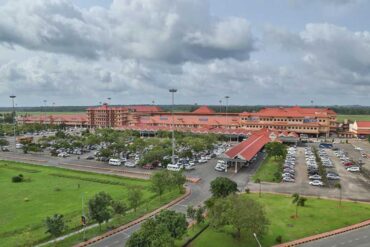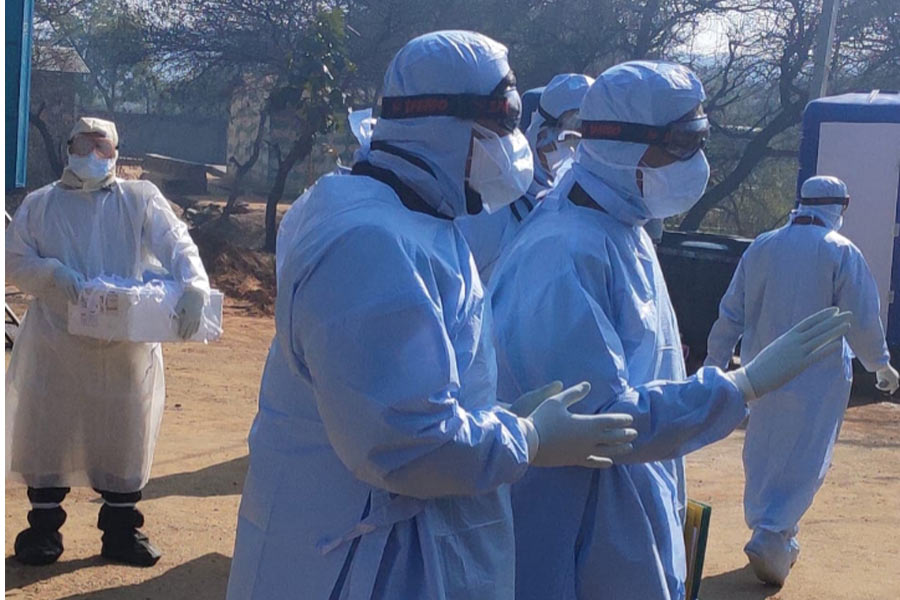Scared to cough, sneeze or even breathe, 650 Indians fled from Wuhan in China, the epicenter of the Novel Coronavirus outbreak that has now claimed 492 lives. They were evacuated from Wuhan in two special Air India flights on February 1 and 2. Getting to the airport was possibly the toughest journey fearing the Novel Coronavirus (nCoV) with every passing moment. Now safely back in India, their troubles should have diminished but not so.
Nearly 300 persons (25 from Kerala), mainly students are now quarantined in two camps—in Manesar near Gurgaon and the other, a camp of Indo-Tibetan Border Police Force (ITBPF) in Haryana. The men are housed in the Manesar camp while the women at the ITBPF camp. The lack of basic facilities in the Manesar camp like clean toilets and buckets to collect water have only heightened their fears on how to combat the killer virus in such conditions when the WHO advisory stresses the highest standards of hygiene and frequent washing of hands with soap and water.
The Journey from Wuhan
The students at the Manesar camp which has around 15 Keralites among them said that it was in December that they first heard about a dangerous virus detected in humans at Wuhan in Hubei province of China. Wuhan is the largest city in the Province and known as the transportation hub of China.
“First the news was that SARS coronavirus (SARS-CoV) which saw a deadly outbreak in 2002, killing 349 in China was detected and the situation was well under control. We were busy with our classes and by January 11, we heard the news on the Chinese media and on BBC that it was a new deadly nCoV and that’s when we started panicking,” Faizal Nazar, a fifth year MBBS student from Kerala, at Wuhan University said.
He said that he immediately rang up the Indian Embassy officials in Beijing and was advised to keep calm and that everything was under control. “The panic and anxiety peaked by January 23 when there was an official announcement that the Wuhan airport would be shut in view of the Coronavirus outbreak. Most of us had by then booked air tickets to fly back home but could not do so as the airport was closed,” Faizal added.
Five-hour-long journey on a Bullet train
According to these students housed in Manesar, those who had fled Wuhan before the Air India flights could be arranged may have contracted the virus while travelling to a far-flung airport. The main reason could be their decision to travel on a bullet train for five hours to reach an airport that was still open and from there to fly back to India, nearly 3853 kilometres away. The railway station in Wuhan from where they had to board the bullet train had already detected several Corona-infected patients and the five-hour-long journey on the bullet train to catch the flight to India and other countries might have led to a virus jump from person to person.
“Nearly half of the Indian students in Wuhan University are from Kerala and there are also several students from other Indian states as well. There were nearly 500 Indian students in Wuhan University and at present less than 10 students have stayed back,” Nazar said.
The students from the university said that with the shutdown of the Wuhan airport they started putting pressure on the officials at the Indian Embassy and they also rang up media persons in India. And finally, two specially-prepped Boeing 747 Jumbo aircraft of Air India landed in Wuhan Airport with the permission of the Chinese government on two consecutive days to bring back a total of 650 persons including seven Maldivians by February 2.
Faizal, who was on board the first flight said that the University had arranged for a bus to the airport from the campus by coordinating with the Indian Embassy and there were 58 Indians on the bus from the campus. “When we reached the airport, there were Indian students from other universities as well. Most of the passengers were students and there were also a few Indian business people on the first flight,” he added.
Manesar Camp
But the ordeal has not ended for these Indians for the Manesar camp where 300 persons are lodged lack toilet facilities and water. “There are only three portable toilets for 300 persons and single bucket for 10 persons at Manesar camp. We have been talking to the authorities at the camp but were told that in army camps the facilities are limited and we need to adjust for the next two weeks until we are allowed to travel to our homes (if cleared off all nCoV symptoms). It’s important that the camp is well equipped when hygiene is of utmost importance to save us from the dreaded virus, in case anyone of us is infected,” a student at the Manesar camp, who wishes to remain anonymous, said.
However, they were happy to say that were provided with quality food and facilities at the ITBPF camp where the women were lodged. The student also said that going by the response of the officials in charge of the Manesar camp, there was no hope of getting proper facilities like more toilets and buckets in the coming days.
Five persons from Manesar who were earlier shifted to a hospital as they showed symptoms of Corona have tested negative for the virus.







